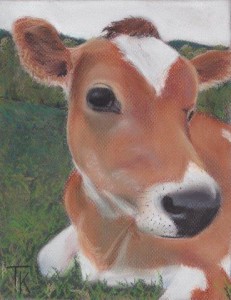by Tinako – Expanding Circle Blogger
[The opinions expressed in these essays do not necessarily reflect the position of ARAUNY.]
I’ve been looking for some time for a concise written explanation of speciesism, without success. I wanted something to hand out at Human Rights Day last December, so I wrote the following, which fits on a small flyer. I’d love to hear whether it makes logical sense to you.
What is Speciesism?
Speciesism is discrimination against nonhuman animals based only on their species or irrelevant characteristics.
“But non-human animals are so different from us, right?”
In some ways, of course. The differences between humans and other animals mean they probably shouldn’t be given the right to vote or drive. But what about more fundamental rights, such as:
- the right not to be property, to be exploited
- the right not to have pain inflicted on them
- the right to their environment and habitat
What would be the relevant criteria here? Most would say it is whether animals have their own interests, and can feel pain. What does science say about whether animals meet these criteria? It says, resoundingly: Yes, they do.
“But animals don’t have… language, social structures, rationality, self-consciousness…”
Actually, science says many animals do. And many humans don’t (such as infants or the cognitively-impaired). So if we don’t offer rights to animals that do have these qualifications, and we don’t strip rights from humans who don’t, we are not deciding based on relevant criteria but merely favoring our own species.
And that is speciesism.
Does speciesism share any features with other biases that most people consider wrong, like racism, ageism, sexism, or heterosexism – features such as:
- ignorance?
- a preference for those who are like us?
- the details considered (such as skin color) are irrelevant to the rights refused (such as freedom from slavery)?
“Wait, that can’t be right. That means we can’t use animals anymore!”
Our culture is so conditioned to think of animals as ours to use however we want, that it can be difficult at first to consider speciesism as wrong. It has always been challenging for people living in biased cultures to break free. But it is being done right now. Alongside people who are trying to eliminate racism and other biases, are people trying to eliminate speciesism, in their own lives and in their culture. Actions against all these biases complement each other, because the root is the same: ignorance about those who seem different.
“How do people avoid speciesism?”
Veganism is the first step, a moral baseline for those who reject speciesism. Veganism includes non-participation in any exploitation of animals. This and other actions we take, such as protecting habitat, supporting legal rights for animals, or reconsidering our speech, can express our respect for all our fellow creatures, and help to build a more just world.
ARAUNY is hosting a discussion on Speciesism coming up on March 23rd (details). One goal will be improving this flyer.

Essay by Tinako is licensed under a Creative Commons Attribution-NonCommercial-ShareAlike 4.0 International License.

